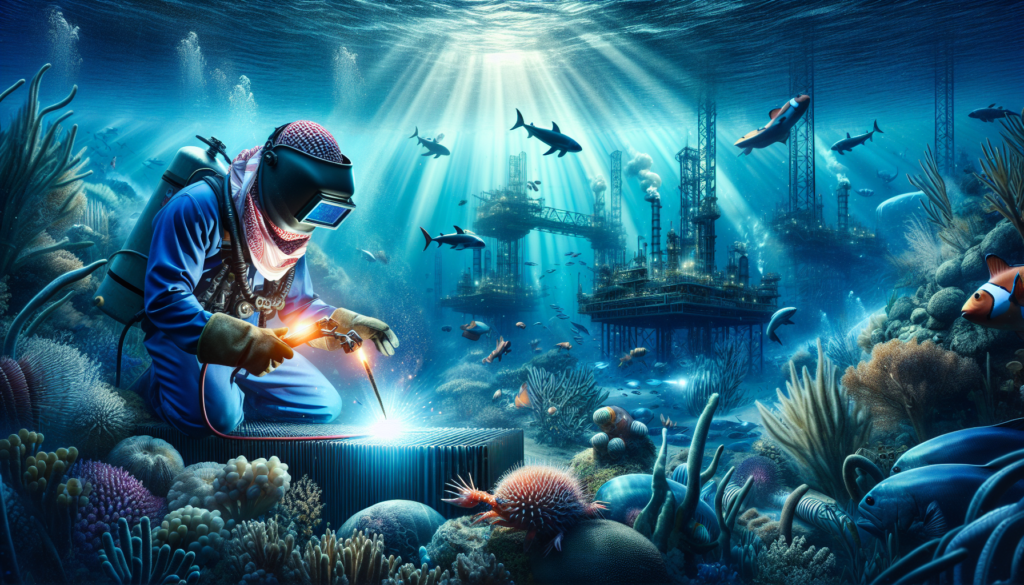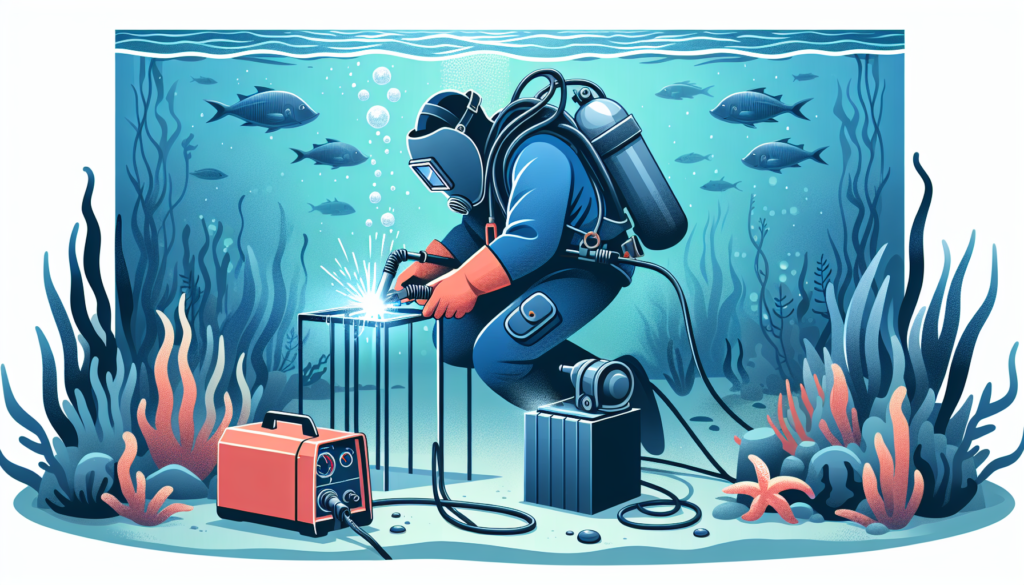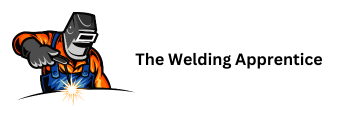Are you fascinated by the idea of working underwater, bringing together your love for welding and your affinity for the deep blue sea? Look no further because this article will provide you with a comprehensive guide on how to become an underwater welder. We will explore the necessary qualifications, training required, and the rewarding career prospects that come with this unique and challenging profession. So, grab your helmet and dive into the depths of this exciting world of underwater welding.

Education and Training
High school diploma or equivalent
To embark on a career in underwater welding, it is essential to have at least a high school diploma or its equivalent. A solid foundation in basic mathematics, science, and communication skills gained in high school will serve as a strong starting point for further education and training.
Vocational training programs
After completing high school, consider enrolling in vocational training programs that specifically focus on preparing individuals for careers in underwater welding. These programs provide a comprehensive curriculum that combines classroom instruction with hands-on experience. They cover topics such as dive theory, underwater welding techniques, and safety procedures.
Certification courses
Obtaining certifications is a crucial step to becoming an underwater welder. Various organizations offer certification courses that validate your skills and knowledge in this specialized field. These certifications serve as a testament to your competence and can significantly enhance your employability and earning potential as an underwater welder.
Physical Fitness and Health Requirements
Good overall health
To become an underwater welder, it is important to maintain good overall health. This physically demanding profession requires individuals to be in good physical condition to handle the rigorous nature of the job. Regular exercise, a balanced diet, and routine medical check-ups are essential to ensure you are fit for the challenges that lie ahead.
Excellent swimming skills
Proficiency in swimming is an absolute must for anyone considering a career in underwater welding. Being comfortable and confident in the water is essential to safely navigate underwater environments and perform welding tasks effectively. Prioritize improving your swimming skills through practice and consider taking swimming lessons if needed.
Physical fitness and strength
Underwater welding requires individuals to work in challenging conditions, often involving heavy equipment and physically demanding tasks. Maintaining physical fitness and strength is crucial to perform these tasks efficiently and with precision. Regular exercise routines that focus on strength training and cardiovascular fitness will help you be prepared for the physical demands of the job.
Diving medical examination
Before pursuing a career in underwater welding, it is mandatory to undergo a diving medical examination. This examination ensures that you are physically fit to handle the unique challenges of working underwater. Qualified medical professionals will assess your health, lung capacity, and overall fitness to determine if you meet the necessary requirements to become an underwater welder.
Acquiring Diving Skills
Enroll in a scuba diving course
To develop the necessary diving skills, it is recommended to enroll in a scuba diving course. Scuba diving courses provide comprehensive training on diving techniques, equipment operation, and safety protocols. By mastering the fundamental principles of scuba diving, you will lay a solid foundation for your journey towards underwater welding.
Gain experience in open water diving
Building experience in open water diving is crucial to become proficient in underwater welding. Open water diving offers opportunities to explore various environments, developing your comfort level and adaptability. Regular exposure to real-life diving scenarios will enhance your skills and deepen your understanding of the underwater world.
Become a certified scuba diver
After completing a scuba diving course, it is essential to obtain a scuba diving certification. Certification demonstrates your competence and knowledge in scuba diving, and it is often a prerequisite for advanced diving certifications. Investing in becoming a certified scuba diver will enhance your credibility as an underwater welder and open doors to further training and opportunities.
Complete advanced diving certifications
To progress in the field of underwater welding, it is crucial to acquire advanced diving certifications. These certifications, such as Advanced Open Water Diver or Rescue Diver, demonstrate your commitment to developing your skills beyond the basic level. Advanced certifications enable you to explore more challenging diving environments and ensure you’re prepared for the demands of underwater welding.
Developing Welding Skills
Enroll in a welding program or trade school
To master the craft of underwater welding, enrolling in a welding program or trade school is highly recommended. These programs provide comprehensive training in welding techniques, safety measures, and equipment operation. The coursework typically consists of both theoretical instruction and hands-on practice, giving you the opportunity to hone your skills under the guidance of experienced instructors.
Learn basic welding techniques
In a welding program or trade school, you will learn the essential welding techniques applicable to both above-water and underwater welding. These techniques include shielded metal arc welding (SMAW), gas tungsten arc welding (GTAW), and flux-cored arc welding (FCAW). Mastering the fundamentals of welding lays the groundwork for further specialization and expertise in underwater welding.
Gain hands-on experience with welding equipment
Practical experience with welding equipment is vital to becoming a proficient underwater welder. Take advantage of hands-on training opportunities provided by your welding program or trade school. Familiarize yourself with the tools of the trade, learn proper equipment maintenance, and practice welding techniques under the supervision of experienced professionals.
Become proficient in various welding methods
Underwater welding involves different methods adapted for varying conditions and requirements. Aim to become proficient in both wet welding and dry welding techniques. Wet welding is performed while submerged in water, using specialized electrodes and equipment, while dry welding involves creating a dry environment for welding tasks. Being well-versed in both techniques will broaden your capabilities as an underwater welder.
Obtain advanced welding certifications
In addition to diving certifications, obtaining advanced welding certifications is a significant step towards professional growth in underwater welding. Industry-specific certifications, such as those provided by the American Welding Society (AWS), showcase your specialized expertise and dedication to mastering underwater welding. These certifications enhance your credibility and increase your chances of securing higher-paying jobs.

Understanding Underwater Welding Techniques
Learn about wet welding
Wet welding, also known as underwater welding, is a technique that allows welding to be performed underwater. It involves using specialized electrodes and equipment designed to operate in a submerged environment. Understanding the principles and techniques behind wet welding is crucial for successful underwater welding operations.
Become familiar with dry welding
Dry welding, as the name suggests, involves creating a dry environment for welding tasks, usually through the use of cofferdams or hyperbaric chambers. This technique eliminates the challenges associated with performing welding tasks in a submerged environment. Familiarize yourself with the equipment and procedures involved in dry welding to expand your skill set as an underwater welder.
Understand the challenges of hyperbaric welding
Hyperbaric welding, a subset of dry welding, presents its own unique challenges. It involves welding in a hyperbaric chamber that simulates the pressure experienced at certain underwater depths. The complex nature of hyperbaric welding requires specialized training and equipment to ensure the safety and success of the welding process.
Gain knowledge of underwater cutting techniques
As an underwater welder, proficiency in cutting techniques is just as important as welding skills. Acquire knowledge of various underwater cutting techniques, including the use of cutting torches and specialized tools designed for underwater use. Understanding the principles and best practices of underwater cutting will enhance your capabilities as an underwater welder.
Gaining Experience in Underwater Environments
Apply for internships or entry-level positions
To gain practical experience in underwater welding, consider applying for internships or entry-level positions in companies specializing in this field. These opportunities allow you to work alongside experienced professionals, broaden your understanding of underwater welding operations, and further develop your practical skills.
Join professional diving organizations
Joining professional diving organizations can provide valuable networking opportunities and access to resources specific to the underwater welding industry. These organizations often offer workshops, seminars, and conferences where you can engage with industry experts, stay updated on industry advancements, and connect with potential mentors or employers.
Participate in underwater welding workshops
Participating in underwater welding workshops is an excellent way to enhance your skills and knowledge in the field. These workshops typically provide hands-on training, allowing you to practice welding techniques and gain valuable feedback from experienced instructors. Look for reputable training centers or organizations that offer specialized workshops in underwater welding.
Seek mentorship opportunities
Finding a mentor who is an experienced underwater welder can greatly accelerate your learning and career progression. Seek out individuals who have achieved success in the field and are willing to share their knowledge and insights. A mentor can provide guidance, offer valuable advice, and help you navigate the challenges and opportunities that come with pursuing a career in underwater welding.
Earning Underwater Welding Certifications
Enroll in a recognized diving school
To earn underwater welding certifications, enrolling in a recognized diving school is essential. Diving schools with specific underwater welding programs offer comprehensive training that combines diving skills with welding techniques. These programs are designed to prepare individuals for the unique challenges and requirements of underwater welding.
Complete an underwater welding training program
Underwater welding training programs are designed to provide in-depth instruction and practical training in the field of underwater welding. These programs cover essential topics such as welding safety, equipment operation, and specialized techniques. Completing a comprehensive underwater welding training program will equip you with the necessary skills to excel in this demanding profession.
Pass certification exams
To obtain underwater welding certifications, you must successfully pass certification exams administered by recognized certification bodies. These exams assess your knowledge, skills, and understanding of underwater welding principles and practices. Adequate preparation through thorough study and practical experience is crucial to ensure success in these exams.
Obtain industry-specific certifications
Industry-specific certifications, such as those offered by the AWS or other reputable organizations, are highly valued in the field of underwater welding. These certifications validate your expertise and proficiency in specific welding techniques, safety protocols, and industry standards. Acquiring industry-specific certifications not only enhances your professional reputation but also increases your chances of securing desirable job opportunities.
Building a Professional Network
Attend industry conferences and events
Attending industry conferences and events provides valuable opportunities to connect with professionals in the field of underwater welding. These gatherings bring together experts, industry leaders, and fellow enthusiasts, allowing you to expand your professional network, stay informed about industry trends, and gain insights from experienced individuals. Make it a priority to attend relevant conferences and events to establish meaningful connections in the industry.
Join professional underwater welding associations
Joining professional underwater welding associations offers numerous benefits, including access to resources, job boards, and networking opportunities. Associations such as the Association of Diving Contractors (ADC) or the Divers Institute of Technology Alumni Association (DITAA) provide platforms for like-minded individuals to connect, share knowledge, and support one another within the industry.
Utilize online networking platforms
In today’s digital world, utilizing online networking platforms is a valuable tool for building a professional network. Platforms such as LinkedIn or specialized forums dedicated to underwater welding can connect you with industry professionals and potential employers. Join relevant groups, actively engage in discussions, and showcase your expertise to enhance your online presence and expand your network.
Finding Employment Opportunities
Research underwater welding companies
Conduct thorough research on underwater welding companies to identify potential employers that align with your career goals and aspirations. Look for companies known for their expertise in underwater welding, their commitment to safety, and their track record in delivering high-quality work. Familiarize yourself with the services they offer and any specific projects they have been involved in.
Apply for job openings
Once you have identified potential employers, actively search for and apply to job openings in the field of underwater welding. Utilize online job boards, industry-specific websites, and company career pages to explore available opportunities. Tailor your resume and cover letter to highlight your relevant skills and experience, emphasizing your commitment to safety and your dedication to excellence in the field.
Create a professional resume and portfolio
Crafting a professional resume and portfolio that showcases your skills, qualifications, and experience is crucial when applying for underwater welding positions. Highlight your diving and welding certifications, outline relevant training programs or courses you have completed, and provide details of any work experience or internships you have undertaken. Additionally, include photographs or videos of your welding work to demonstrate your expertise and capabilities.
Prepare for interviews
Preparing for interviews is essential to make a positive impression on potential employers. Research common interview questions specific to underwater welding, and practice your responses to ensure clarity and confidence during the interview process. Demonstrate your knowledge of industry standards and emphasize your commitment to safety, teamwork, and continuous professional growth.
Continuing Education and Advancement
Stay updated on industry advancements
The field of underwater welding is constantly evolving, with new technologies and techniques being introduced. It is crucial to stay updated on industry advancements through continued learning and engagement. Subscribe to industry publications, follow reputable online resources, and attend professional development workshops to ensure you are aware of the latest trends and innovations in underwater welding.
Pursue additional certifications and training
Continued education and training play a vital role in professional growth as an underwater welder. Pursue additional certifications that expand your expertise in specific areas of underwater welding, such as underwater inspection or non-destructive testing. Continuously seek opportunities to enhance your skills and knowledge through advanced training programs or specialized courses.
Explore specialized areas of underwater welding
As you gain experience and expertise in underwater welding, consider exploring specialized areas within the field. These may include offshore oil and gas industry projects, bridge and dam repairs, or underwater salvage operations. By focusing on specific sectors or projects, you can develop a niche expertise that sets you apart from other underwater welders and opens up new career opportunities.
Consider career advancement opportunities
With experience and additional certifications, opportunities for career advancement in underwater welding become available. This may include taking on leadership roles, becoming a project manager, or even starting your own underwater welding business. Continually assess your career goals and identify pathways for advancement that align with your aspirations and personal growth objectives.
Embarking on a career in underwater welding requires dedication, commitment, and a passion for both the underwater world and the art of welding. By following the outlined steps, continuously seeking opportunities for growth, and staying up to date with industry advancements, you can position yourself as a highly skilled and sought-after underwater welder. Remember, it is not just about the certifications you acquire, but also the practical experience, professionalism, and dedication to quality that will set you apart as you dive into this unique and rewarding profession.
